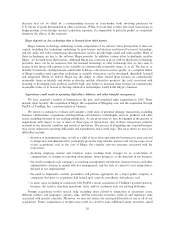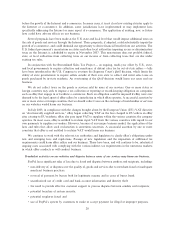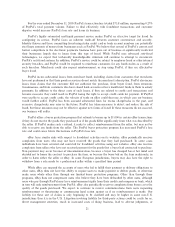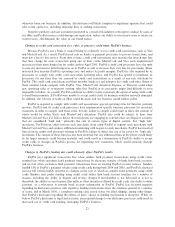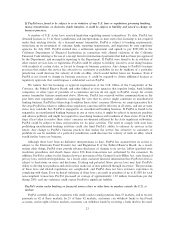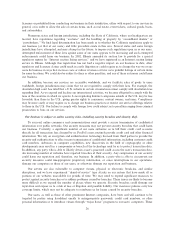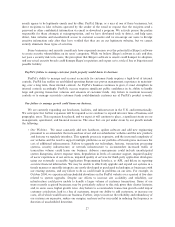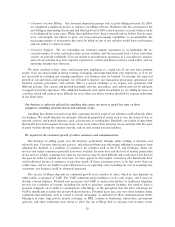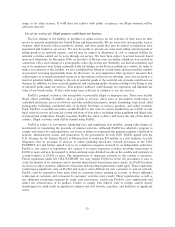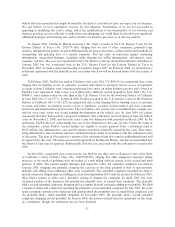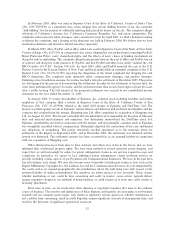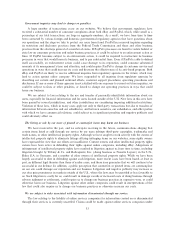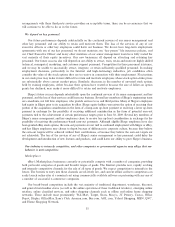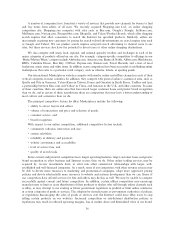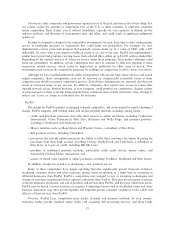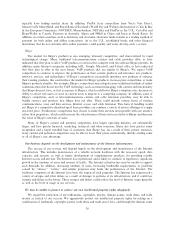eBay 2005 Annual Report Download - page 32
Download and view the complete annual report
Please find page 32 of the 2005 eBay annual report below. You can navigate through the pages in the report by either clicking on the pages listed below, or by using the keyword search tool below to find specific information within the annual report.‚Customer Account Billing. Our revenues depend on prompt and accurate billing processes. In 2004,
we completed a significant project to enhance our billing software. Problems with the conversion to the
new billing system during the second and third quarters of 2004 caused incorrect account balance totals
to be displayed for some users. While these problems have been corrected and we believe that no users
were overcharged, our failure to grow our transaction-processing capabilities to accommodate the
increasing number of transactions that must be billed on any of our websites would harm our business
and our ability to collect revenue.
‚Customer Support. We are expanding our customer support operations to accommodate the in-
creased number of users and transactions on our websites and the increased level of trust and safety
activity we provide worldwide. If we are unable to provide these operations in a cost-effective manner,
users of our websites may have negative experiences, current and future revenues could suffer, and our
operating margins may decrease.
We must continue to hire, train, and manage new employees at a rapid rate. If our new hires perform
poorly, if we are unsuccessful in hiring, training, managing, and integrating these new employees, or if we are
not successful in retaining our existing employees, our business may be harmed. To manage the expected
growth of our operations and personnel, we will need to improve our transaction processing, operational and
financial systems, procedures, and controls. This is a special challenge as we acquire new operations with
different systems. Our current and planned personnel, systems, procedures, and controls may not be adequate
to support our future operations. The additional headcount and capital investments we are adding increase our
cost base, which will make it more difficult for us to offset any future revenue shortfalls by expense reductions
in the short term.
Our business is adversely affected by anything that causes our users to spend less time on their
computers, including seasonal factors and national events.
Anything that diverts our users from their customary level of usage of our websites could adversely affect
our business. We would therefore be adversely affected by geopolitical events such as war, the threat of war, or
terrorist activity, and natural disasters, such as hurricanes or earthquakes. Similarly, our results of operations
historically have been seasonal because many of our users reduce their activities on our websites with the onset
of good weather during the summer months, and on and around national holidays.
We depend on the continued growth of online commerce and communications.
The business of selling goods over the Internet, particularly through online trading, is dynamic and
relatively new. Concerns about fraud, privacy, and other problems may discourage additional consumers from
adopting the Internet as a medium of commerce. In countries such as the U.S. and Germany, where our
services and online commerce generally have been available for some time and the level of market penetration
of our services is high, acquiring new users for our services may be more difficult and costly than it has been in
the past. In order to expand our user base, we must appeal to and acquire consumers who historically have
used traditional means of commerce to purchase goods. If these consumers prove to be less active than our
earlier users, and we are unable to gain efficiencies in our operating costs, including our cost of acquiring new
customers, our business could be adversely impacted.
The success of Skype depends on continued growth in its number of users, which in turn depends on
wider public acceptance of VoIP. The VoIP communications medium is in its early stages, and it may not
develop a broad audience. Potential new users may view VoIP as unattractive relative to traditional telephone
services for a number of reasons, including the need to purchase computer headsets, the need to leave a
personal computer on in order to communicate with Skype, or the perception that the price advantage for
VoIP is insufficient to justify the perceived inconvenience. Potential users may also view more familiar online
communication methods, such as e-mail or instant messaging, as sufficient for their communications needs.
Managers of some large private branch exchange, or PBX, systems in businesses, universities, government
agencies, and other institutions may refuse to allow the use of Skype due to concerns over security, server
28


